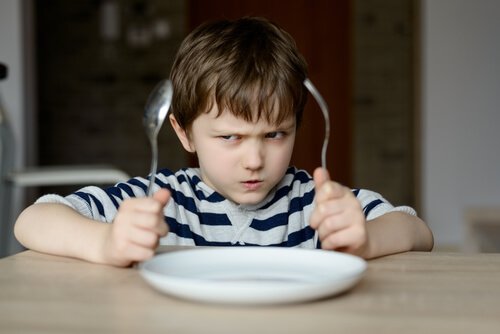The Little Emperor Syndrome, or The Child Tyrant

It is increasingly common to see young children challenging, defying and mocking their parents or other authority figures. The concerning thing is that these attitudes seem to be escalating to an extreme: parents being mistreated by their children. We’re talking about the Little Emperor Syndrome, the child tyrant.
Both in my professional practice and everyday life, it’s becoming more and more normal to see children hitting their parents, insulting them, making fun of them and much more in order to get what they want.
The most striking thing is that the more tyrannical attitudes that the child expresses, the greater the effort the adult in charge makes to please him or her. An adult overwhelmed by the demands of their son or daughter ends up feeling guilty for not satisfying their wishes.
To get to know the characteristics of the Little Emperor Syndrome, we’re going to tell real-life story I witnessed a few weeks ago on summer vacation. Let’s take a look.
The situation: the little emperor doesn’t want to eat
A family — father, mother and a child about 5 years old — is eating in a restaurant with quite a few people around them. The mother, almost sweating, tries to feed her son, something he knows how to do by himself but right now is refusing to do.
The heart of the matter is not that the child doesn’t want to eat, but rather that right now he only wants to drink from the Coke his mother ordered at the bar. The child won’t let go of the glass, even after she has counted to three.
So then the mother believes the best idea is to negotiate with the child and tells him, “you can only drink the Coke if you eat your steak”.

The child’s bad behavior and derogatory words towards his mother increase. Among them are, “I won’t eat that disgusting steak just because you told me to” and “I already told you I’m not going to eat it, don’t you understand me when I’m talking to you?”
Meanwhile, the father is a mere spectator of the conflict that he observes with an apathetic look on his face.
After struggling over the glass of Coke, the mother can’t find a way to satisfy her son and gives up. The child ends up drinking all he wants, meanwhile teasing his mother and kicking under the table.
The final touch is a reprimand from the mother that, of course, the child won’t take seriously: “you’ll see, no going to the pool for you today”.
At this point, the little emperor already has enough resources to win in this type of situation. In the future, he knows he only has to fight a little harder with the glass of Coke.
Characteristics of the Little Emperor Syndrome
At the root of the situation we just described, we can point out some of the characteristics of the Little Emperor Syndrome or the “child tyrant”:
- Exaggerated perception of what belongs to him. He does not ask, he demands; he’s not satisfied with anything. When he gets what he wants, he wants even more.
- Low tolerance for frustration, boredom or denial of what he has requested. In these cases, he responds with tantrums, anger, insults or violence in front of family and friends, regardless of whether they’re in public.
- He shows very little problem-solving ability. He is used to others resolving problems for him.
- His egocentricity makes him firmly believe that the world revolves around him.
- He always finds justification for his behavior and blames others for the what he has done.
- He does not empathize. Therefore, he does not feel remorse when he shouts, threatens or physically assaults.
- He argues about rules and punishments with his parents, which he will call bad or unfair. This aspect benefits him, since it makes them feel bad and give in to him, offering more privileges.
- He does not respond well to authority figures or social norms.
- He has low self-esteem, but this is masked by his tyrannical behavior.
- Most of the time he is sad, anxious, angry, etc.

How does a child get the Little Emperor Syndrome?
As we mentioned at the beginning, we are coming across more and more children like this. But why the increase in this phenomenon?
In addition to genetic predisposition, it seems that the responsibility lies mainly in two things: a permissive parenting style and the influence of society.
Lacking clear boundaries makes children believe, wrongly, that they have the right to do whatever they want whenever they want. Within that belief, they are not aware that rewards require prior effort and that they must respect others.
On the other hand, we can’t ignore the influence of the consumerist and individualist society we live in; nor the rigid working day that most parents have, which affects quality time with their children.

A healthy child needs clear boundaries
If we look at all these factors combined, we can make a theory that kids get used to not valuing things and putting their immediate desires above all else. Likewise, parents also end up frustrated. Whatever you do, your child will not be satisfied.
To raise strong, healthy and emotionally intelligent children, we must set clear boundaries from the beginning. It is essential that children experience some degree of frustration, so that they can understand that the world requires effort and respect towards others.
Letting the world revolve around them does them a disservice, because a child who has not experienced frustration is a child with a certain weakness.
In the future, they will have trouble handling new situations and solving problems because they will discover that life does not bend to their will. Not everything be exactly how they want it to be.
All cited sources were thoroughly reviewed by our team to ensure their quality, reliability, currency, and validity. The bibliography of this article was considered reliable and of academic or scientific accuracy.
- Garrido, V. (2005). Los hijos tiranos. El síndrome del emperador. Ariel, Barcelona.
- Pereira, R., & Bertino, L. (2009). Una comprensión ecológica de la violencia filio-parental. Violencia familiar, 226.
- Urra, J. (2012). El pequeño dictador. Grupo Ilhsa SA.
This text is provided for informational purposes only and does not replace consultation with a professional. If in doubt, consult your specialist.








